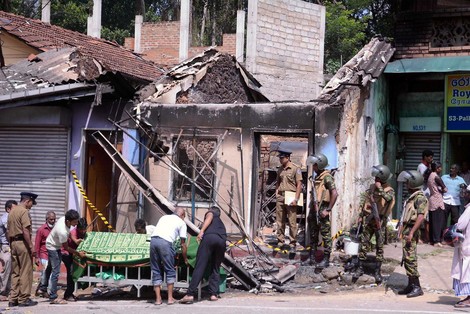Your podcast discovery platform
Curious minds select the most fascinating podcasts from around the world. Discover hand-piqd audio recommendations on your favorite topics.

piqer for: Global finds Technology and society
Prague-based media development worker from Poland with a journalistic background. Previously worked on digital issues in Brussels. Piqs about digital issues, digital rights, data protection, new trends in journalism and anything else that grabs my attention.
Social Media's Role In Fanning Communal Violence
In Sri Lanka, the national telecom authority introduced a three-day blockade on social media networks, including Facebook, Viber and Whatsapp, in an effort to quell the ongoing anti-Muslim riots and violence. The government also imposed a state of emergency — the first since the end of the civil war era — after members of the country’s mostly Buddhist Sinhalese majority attacked mosques and businesses belonging to minority Muslims and clashed with police in the central highlands.
"Some of the violence has been instigated by Facebook postings that threatened more attacks on Muslims, the government said. On Wednesday, it said Facebook, Viber and WhatsApp would be blocked across Sri Lanka for three days. Facebook, which owns WhatsApp, said it was working to identify and remove incitements to violence and was in contact with the government and private organizations," writes Reuters.
Sri Lanka is not the only country in Asia where social media has been instrumental in instigating communal violence, with false information exacerbating the rising religious tensions within the region. Recent reports showed how social media fermented nationalistic fervour and anti-Rohingya hatred in Myanmar. The platforms have also incited Hindu–Muslim conflict in Bangladesh, where, for example, 30 Hindu houses were burned and several people got injured by a village mob over an anti-Muslim Facebook post shared by a fake account. In neighbouring India, online rumours about child abductions and occult gangs harvesting women's hair triggered the deaths of several people.
So far, in Sri Lanka, the commentators seem to mostly blame the authorities, rather than the tech companies involved, criticising the shut down for curbing press freedom and access to information or leaving relatives without contact and unable to locate their family members. Undoubtedly the response was ill-advised, but it's still worth noting that, again, it's the government that must fix the mess that tech has enabled.
Stay up to date – with a newsletter from your channel on Global finds.
